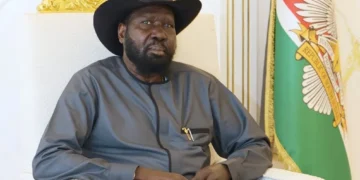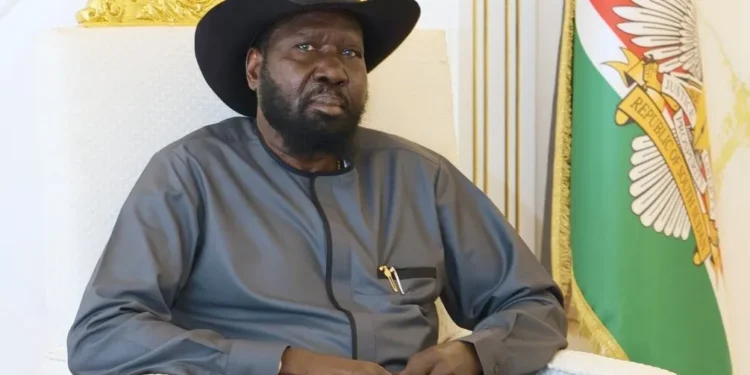President Salva Kiir Mayardit has announced major changes in his government, signaling a fresh political realignment aimed at boosting service delivery and balancing the country’s fragile political landscape.
In a series of presidential decrees read on South Sudan Broadcasting Corporation (SSBC) on Monday evening, Kiir relieved Emmanuel Primo Okello of his duties as Governor of Western Bahr el-Ghazal State and appointed Sherif Daniel Sherif as his replacement.
President Kiir also made changes within key national institutions, removing Taban Abel from his post as Deputy Commissioner of the South Sudan Revenue Authority, and naming John Malek as the new deputy commissioner.
In another decree, Kiir reshuffled his cabinet, moving key ministers to new portfolios, as Wek Mamer was shifted from the Ministry of Justice and Constitutional Affairs to the Ministry of Parliamentary Affairs.
However, Dr. Joseph Geng Akec was removed from the Ministry of Youth and Sports and appointed as the new Minister of Justice and Constitutional Affairs.
Furthermore, Mary Nawai, previously Minister of Parliamentary Affairs, was reassigned to head the Ministry of Youth and Sports.
Former Governor Emmanuel Primo Okello, a long-serving political figure in Western Bahr el-Ghazal, has been credited with maintaining relative calm in one of the country’s most diverse states, and his removal marks the end of an era that many observers considered both stabilizing and controversial.
Meanwhile, Hon. Mary Nawai, one of the few female ministers in the cabinet, has been entrusted with the Youth and Sports docket. Known for her grassroots political mobilization and vocal advocacy for women’s participation in leadership, her reassignment is expected to inject new energy into youth engagement and sports development across the country.
Analysts say the reshuffle reflects President Kiir’s attempt to recalibrate his administration amid ongoing challenges in governance, service delivery, and the implementation of the 2018 peace agreement.
“This is more than just a routine reshuffle it’s a political statement,” said one Juba-based political analyst. “By moving strong figures like Okello and promoting women leaders such as Mary Nawai, the President is balancing internal alliances while also trying to project inclusivity.”
Supporters of the changes argue that the moves will strengthen institutional performance. “Leadership changes are part of growth,” said a senior government insider. “South Sudan needs fresh ideas and a renewed sense of accountability, and that is what the President is pushing for.”
With the reshuffle, attention now turns to how the newly appointed leaders will perform in their respective roles, especially in a country still struggling with economic hardship, political fragility, and security concerns.
For many citizens, the hope is that the new team will focus less on political maneuvering and more on addressing pressing issues such as inflation, youth unemployment, and the slow pace of reforms.
As one citizen put it on a social media while reacting to the move citing that.“What we need now is action, not politics. We want leaders who will serve the people and make a difference in our lives.”












